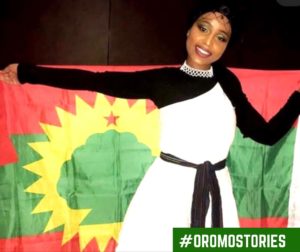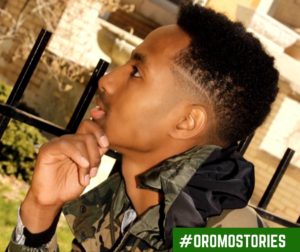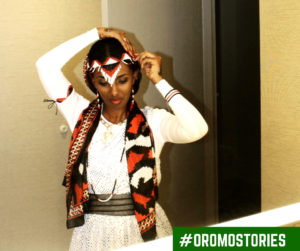 I came to the United states at the age of 16. The first time I stepped foot in the airport was also my first time seeing my dad in 14 years.
I came to the United states at the age of 16. The first time I stepped foot in the airport was also my first time seeing my dad in 14 years.
My father left his family, career and everything else behind to fight for his country, people, and his identity( oromumma). Before leaving his home country my dad was an Affan Oromo teacher in high school and the government started investigating him because he continuously reminded his students to be proud of their language and culture, he use to teach them the sacrifices our ancestors paid for Oromo people to get education in their own language. This made the Ethiopian government to come after my dad in attempt to put him in jail, which is why my dad immediately fled to Kenya when I was only 2 years old.
Growing up in Ethiopia didn’t quit understand how Oromo people were treated differently than other groups of people because it was not talked about openly. In fact people got jailed and tortured for speaking on the discrimination Oromo people faced in Ethiopia. I also didn’t understand the reason why my father wasn’t around and it was very hard not knowing when I was going get to see him again.
Coming to the United states and getting to know my dad all over again has helped me gained deeper understanding of the Oromo people struggle. I learned that due to oppression and inequality in Ethiopia many Oromos like my father left their homes and families behind seeking better experience in life. I learned that there was time when the Oromo language was banned from being used for educational purposes, moreover my own mother had to change her name into non Oromo name in order to go to school. Learning all the challenges my people has faced and continued to face led me to be proud of my identity more than ever.
To me oromumma is my identity, it is being able to be proud of my culture, traditions, language, country(Oromia), and history without fear of being jailed or tortured. Additionally Oromumma mean having freedom of speech and sense of belonging in my own country.”
By Ayantu Bedaso (@ayantu_beauty) – Columbus, OH, USA
 I came from Ethiopia when I was three and unfortunately I seem to have no memory of my family’s beloved motherland, Oromia. However while growing my parents would tell me tales of their adventures in Oromia and how their fathers and forefathers fought for democracy and freedom. My family members were proud to say they were from Oromia. Eventually they realized that Oromumma meant nothing to me and I had no clue about our traditions, culture, and language.
I came from Ethiopia when I was three and unfortunately I seem to have no memory of my family’s beloved motherland, Oromia. However while growing my parents would tell me tales of their adventures in Oromia and how their fathers and forefathers fought for democracy and freedom. My family members were proud to say they were from Oromia. Eventually they realized that Oromumma meant nothing to me and I had no clue about our traditions, culture, and language.
My family took it upon themselves to educate me in our culture, traditions, and language. They immersed me into a thriving Oromo community culture in Minnesota. They had me read books and develop my Oromo language skills. I stayed with my grandmother and I picked up funny Oromo words that older people use. As my knowledge of the culture grew, I started helping my sister with her political advocacy work to help the Oromo people. After all the advocacy work by thousands of people House Resolution 128 was passed and this led to fair elections in Ethiopia and simple human rights for our people.
Before my parents immersed me into the culture I had zero connections to the Oromo people and those many people who died fighting for basic rights. As a human I cared but otherwise it didn’t affect me that hard like it did my parents and family members, but now I have grown and I shall advocate for the people whose voices have been scared shut. Now I have strong ties to Oromos and I will never stop working until their rights are equal to ours, Americans. My oromumma is strong now and I will dedicate my life to helping others in need like the Oromo people.”
By Fraol Jimjimo (Chicago, IL, USA)
 I went back home for the first time after almost 17 years. It was a difficult trip! Almost 17 years is a long time be be away from what you called home because so much has changed – with you and with them. I got sick, angry at the unfamiliarity, and battled with the blurred lines when it came to identity. Was I American or African? But I learned that the only reason I am who I am today is because my father and grandfather (mom’s side) left the deep country (badiyaa). That continued to hit hard. My privilege became very apparent to me and the little of my American dream began to dissolve when I returned.
I went back home for the first time after almost 17 years. It was a difficult trip! Almost 17 years is a long time be be away from what you called home because so much has changed – with you and with them. I got sick, angry at the unfamiliarity, and battled with the blurred lines when it came to identity. Was I American or African? But I learned that the only reason I am who I am today is because my father and grandfather (mom’s side) left the deep country (badiyaa). That continued to hit hard. My privilege became very apparent to me and the little of my American dream began to dissolve when I returned.
There is no need for a house for two (bigger), new car (upgrade), fancy career (status), or lots of money in the bank (get fat). The cliché – having indoor plumbing and a door – is luxury enough. Moving to a different location was the only difference between me and some of my cousins who face so much hardship. That is why I gravitate to my Orommuma rather other parts of me: Can’t forgot them, what I saw, or that lesson.”
By Ayyaantu A (@magaleeexplores) – Washington DC area

